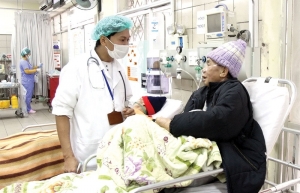Foreign investors expect enforcement of new medical examination legislation
The Presidential Office on February 3 announced the promulgation of the revised Law on Medical Examination and Treatment. What does the law mean to the healthcare system at this time?
 |
| Vu Tu Thanh, deputy regional managing director and Vietnam chief representative at the US-ASEAN Business Council |
We consider this to be an essential legal document to help the hospital system operate efficiently and safely. The new law has many positive points, removing difficulties for medical examination and treatment activities, especially in public hospitals. The law also puts the patients at the centre of all service activities on the basis of increasing their access to high-quality services, and in line with international practices. In particular, it focuses on speeding up the reform of administrative procedures and the application of IT in exam and treatment activities, such as applying electronic prescriptions and e-records. This information must be connected with the information system for management of such activities, to control and monitor the quality of service provision of practitioners, and to link among facilities.
This will help activities be deployed more quickly, effectively, and systematically.
How will the revised law impact on members of US-ASEAN and do the changes meet their expectations?
It has very positive changes to the healthcare market, and our member companies in the medical equipment sector – especially in terms of regulations on autonomy for public medical treatment facilities, and regulations on private investment engagement in related activities.
This is a legal corridor to help medical facilities take the initiative in purchasing, renting, and borrowing modern medical equipment for medical treatment; create opportunities for patients to access advanced treatment methods; and help medical facilities increase their income and financial autonomy. We highly appreciate that the revised law has put the procurement with deferred payment and renting of medical equipment into the law as this has been a very urgent need of the market for a long time, but has not been recognised by any law.
Does the revised law have any issues in need of more amendments to facilitate business activities and to align with international practices?
The law will become effective at the start of 2024. We do not have much time left, so we hope that the government and the Ministry of Health will promptly issue sub-law documents guiding the implementation, so that the law can be applied on time. Especially, documents are required to guide the implementation of Chapter 10, which involves conditions to ensure related activities, including conditions for financial security, and procedures for renting and borrowing medical equipment. We also need guiding documents on the calculation of medical service prices, as well as the price bracket for related services, so that hospitals can soon apply them.
 | Bringing the fresh air to healthcare The amended Law on Medical Examination and Treatment to come into effect from early 2024 is expected to have a significant impact on how related establishments conduct their day-to-day business. Ngo Thanh Hai, lawyer at LNT & Partners, analyses the notable changes and market impact. |
What the stars mean:
★ Poor ★ ★ Promising ★★★ Good ★★★★ Very good ★★★★★ Exceptional
 Tag:
Tag:
Related Contents
Latest News
More News
- Citi economists project robust Vietnam economic growth in 2026 (February 14, 2026 | 18:00)
- Sustaining high growth must be balanced in stable manner (February 14, 2026 | 09:00)
- From 5G to 6G: how AI is shaping Vietnam’s path to digital leadership (February 13, 2026 | 10:59)
- Cooperation must align with Vietnam’s long-term ambitions (February 13, 2026 | 09:00)
- Need-to-know aspects ahead of AI law (February 13, 2026 | 08:00)
- Legalities to early operations for Vietnam’s IFC (February 11, 2026 | 12:17)
- Foreign-language trademarks gain traction in Vietnam (February 06, 2026 | 09:26)
- Offshore structuring and the Singapore holding route (February 02, 2026 | 10:39)
- Vietnam enters new development era: Russian scholar (January 25, 2026 | 10:08)
- 14th National Party Congress marks new era, expands Vietnam’s global role: Australian scholar (January 25, 2026 | 09:54)





















 Mobile Version
Mobile Version